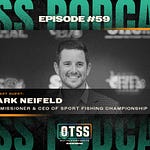Brendan Ballou Discusses Private Equity on “Only The Strong Survive”
In the second part of our two-part series on private equity, “Only The Strong Survive” host Dan Kahn talks to Brendan Ballou. The author of “Plunder: Private Equity’s Plan to Pillage America,” Ballou is a federal prosecutor who served as Special Counsel for Private Equity in the Justice Department’s Antitrust Division. Before that, he worked in private practice along with the National Security Division of the Justice Department, advising multiple administrations on counterterrorism. Ballou’s unique background gives him deep insight into the often-murky world of private equity (PE).
While our previous episode dealt with the upsides of private equity, of which there can be many, Brendan discusses the darker side of PE with Dan. As the title of his book suggests, private equity can have many negative aspects associated with it. So, do these negatives outweigh the positives? Or does private equity sit somewhere between good and bad? Examining both sides of an issue is always important, and that is exactly what Dan and Brendan do in this episode of “Only The Strong Survive.” Click on the icon above to hear the complete in-depth discussion. Here are our top five takeaways:
Private equity and its effects are widespread.
Financial decisions are not always the best business decisions.
Short-term thinking can be rampant in private equity.
There are lots of challenges in changing the private equity sector.
While it might seem like all doom and gloom, there is hope.
Private Equity Impacts Everyone
Many people think of private equity as a distant business “thing” that doesn’t really affect their lives. However, that isn’t true. Private equity's vast scale means it impacts almost every consumer, whether they realize it or not. Operating behind the scenes, private equity’s influence can be difficult for many to perceive, but it is almost always there.
“In terms of the impact that private equity has had, it is just enormous,” says Ballou. “Private equity firms spent over $1 trillion buying up businesses last year. So, just about every aspect of society and the economy is affected by it. Whether you are talking about healthcare, retail, finance, prisons, housing or leisure activities, just about everywhere private equity is active. It is really transforming how these businesses work.”
Private Equity Firms are Financially Focused
The vast majority of people working in private equity are not business leaders or entrepreneurs. Instead, they are from the financial sector. While this might seem benign at first, it means few people in PE have business, marketing or sales backgrounds. Having people run a company who aren’t necessarily business savvy can be a recipe for disaster.
“I think one thing that is really important to convey is that the folks that run private equity firms and the folks that they typically install to run the businesses they buy very often do not have traditional business backgrounds in marketing, sales, logistics and so forth,” says Ballou. “Their backgrounds are primarily in finance and, to a lesser extent, the law. What that means is that the changes they try to make in companies are very often financial ones rather than operational ones. In fact, when they try to make operational changes, often times it ends very badly.”
Short-Term Thinking is Prevalent
House flippers and private equity have a lot in common: neither intends to hold onto their purchases for a long time. This leads to many house flippers cutting as many corners as possible to save money because they don’t have to live in a house for long (if at all). That same short-term thinking and “business model” is also prevalent in PE, as most firms only keep a company for 3-5 years. Short-term gains are often made at the cost of long-term pain.
“One of the problems that I argue that the private equity industry has is they want to sell the companies they buy just a few years later. That changes your perspective on the business,” says Ballou. “I always say that if I were trying to maximize the value of my apartment over 20 years, I would redo the kitchen. If I were trying to maximize the value of my apartment over two weeks, I would burn it down and try to collect the insurance money. How long you hold an asset changes how you treat it.”
Private Equity Has Powerful Political Influence
In our current “charged” political environment, it can be hard to believe that Republicans and Democrats agree on anything. However, both the Obama and Trump administrations tried to apply more scrutiny to what is an often-opaque sector. Neither succeeded, leading many to wonder why private equity can’t be controlled more. The answer is that private equity has some powerful political friends.
“Another challenge we have is that private equity firms are enormously successful at getting their way with government. They and investment firms have spent something like $900 million on federal candidates and elected officials over the last 30 years or so,” says Ballou. “They have hired former cabinet members, generals, CIA directors and at least two Speakers of the House. They are all working for private equity firms and are their advocates, so there are a lot of structural challenges to change.”
There is Hope
While private equity has some upsides, it also has some serious negatives. Is it all doom and gloom, though? Will private equity take over most of America and create a death spiral of business demise? Will short-term business thinking become the new normal? While focusing on the dark side of PE, Ballou does have hope for the future.
“I actually do think there are reasons to be optimistic here. I have seen enormous progress happen on, for instance, advocacy around private equity in the prison and nursing home industries,” says Ballou. “There has been legislation and rule-making at both the state and federal level on many of these issues because people are committed and passionate about them. It is not just that change is possible, but change is actually happening in specific areas, which is great.












